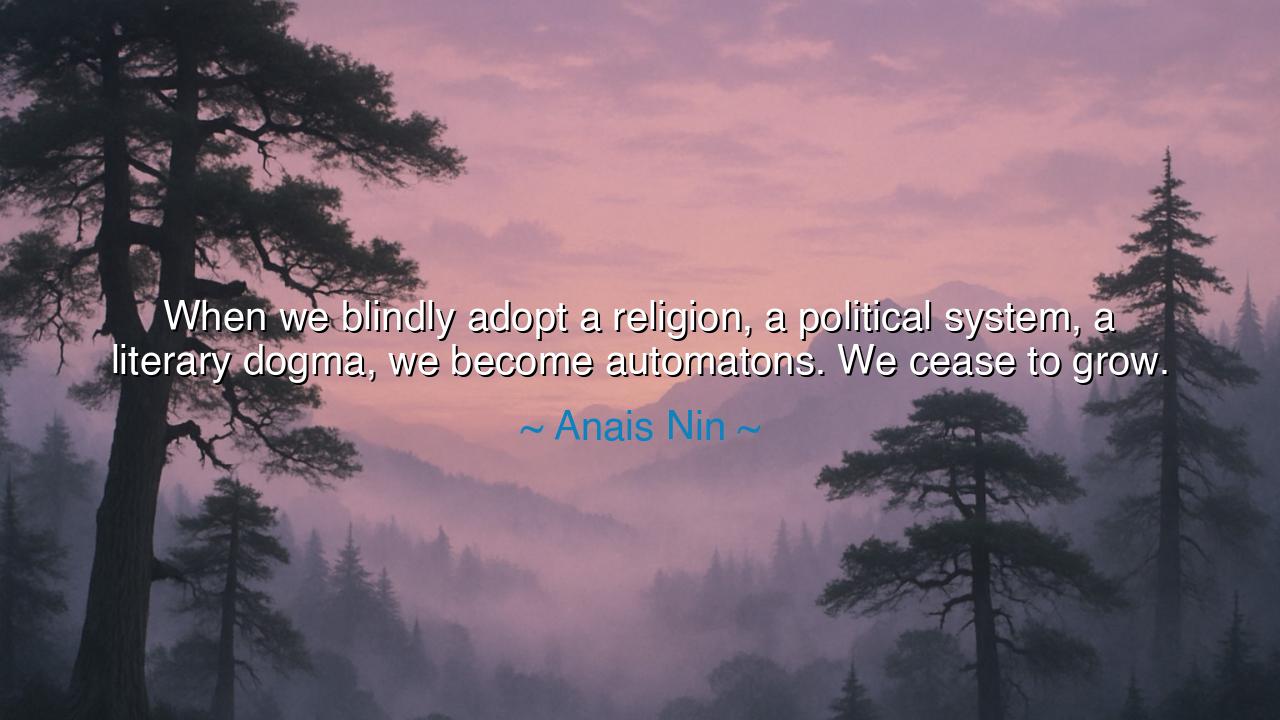
When we blindly adopt a religion, a political system, a literary
When we blindly adopt a religion, a political system, a literary dogma, we become automatons. We cease to grow.






"When we blindly adopt a religion, a political system, a literary dogma, we become automatons. We cease to grow." Thus spoke Anaïs Nin, a voice of fire and introspection, a woman who walked the paths of imagination and the inner life with unflinching courage. In these words lies a truth that echoes across the centuries: that the soul, when it surrenders its freedom to think, to question, and to feel, becomes not a living flame but a machine of habit. To live without reflection is to move without direction—to breathe without spirit. Nin warns that when belief is swallowed without understanding, when loyalty is given without discernment, the mind ceases to grow and the heart ceases to awaken.
In the days of the ancients, the philosophers taught that wisdom begins with wonder, and wonder cannot live where blindness reigns. To blindly adopt anything—whether creed, law, or art—is to clothe oneself in another’s shadow and mistake it for light. The human being, born for thought and discovery, becomes instead a puppet, swayed by the strings of others’ convictions. Nin saw this not only in the politics of her time, but in the hearts of individuals who sought safety in conformity rather than truth. For what is an automaton, if not a creature that moves but does not live, that acts without knowing why?
Consider the tale of Galileo Galilei, who gazed upon the heavens and saw what the world refused to see. In his day, the doctrines of religion and philosophy were held sacred—unchallenged, unquestioned. But Galileo dared to look through the telescope, to seek truth with his own eyes. For this courage, he was condemned, silenced, and confined. Yet in that quiet prison, his spirit grew freer than all his accusers’. He refused to become an automaton, repeating what was taught; he remained alive in the one way that matters—by thinking. History remembers him not for obedience, but for growth through questioning.
Anaïs Nin lived in an age when the spirit of conformity wore many masks: religion, ideology, fashion, even art. She saw how men and women built walls of imitation, mistaking safety for enlightenment. To her, the greatest tragedy was not error but stagnation—the moment when a soul ceases to inquire and becomes content with borrowed answers. “We cease to grow,” she said, and in that phrase lies the death of all creation. For the growing mind is like a tree, rooted in the earth yet reaching toward the sky; but the unthinking mind is a vine that coils inward, strangling its own life.
There is something heroic in the act of thinking for oneself. It is not an easy path—it demands solitude, courage, and the willingness to be misunderstood. Yet those who dare to question the systems around them—religious, political, or intellectual—become the torchbearers of renewal. Every age has its prophets who defy the machinery of blind belief. Socrates in Athens, Rosa Parks in Montgomery, Vaclav Havel in Prague—all refused to move as automatons; they chose the risk of growth over the comfort of obedience. Their courage teaches that the soul grows not by agreeing, but by awakening.
To live wisely, then, is not to reject belief but to illuminate it with reason. Faith, when understood, becomes strength; politics, when guided by conscience, becomes justice; art, when born of truth, becomes beauty. But all these wither when followed blindly. Nin’s words call not for rebellion against all systems, but for awareness within them. The true seeker does not destroy tradition—he examines it, refines it, and makes it his own. In this way, the individual remains alive amid the crowd, unique amid the multitude.
So, dear listener, remember this: never surrender your mind to ease, nor your spirit to the comfort of the herd. Ask, always—Why do I believe this? Why do I follow this? What truth lies beneath? Read sacred books, but read also the book of your own heart. Hear the leaders of men, but weigh their words against your conscience. And above all, keep growing. For when thought ceases, the soul begins to die.
To grow is to live; to question is to rise; to understand is to become truly free. Be not an automaton, but a creator of meaning. And let your life, guided by reflection and courage, become a flame that others may see—and awaken.






AAdministratorAdministrator
Welcome, honored guests. Please leave a comment, we will respond soon